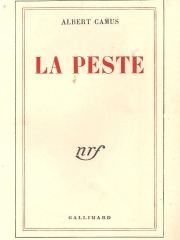The Plague by Albert Camus
In the same Eslite where I saw a bunch of Keigo Higashino books, I also found The Plague on a special coronavirus table setup. It reminded me to read a French book again. However, three pages in, I knew I had no chance. I had to look up every other word, and I couldn’t even construct the sentences afterwards. I decided to cut my losses and switch to the English version. It quickly became clear why I had struggled so much. Even in English, I looked a word up every five pages.
1) “Actually the municipality had not contemplated doing anything at all, but now a meeting was convened to discuss the situation.”
The main takeaway from this book is that we’ve seen this all before, and nothing has changed.
2) “‘When crossing a a street, he steps off the sidewalk without changing his pace, but two out of three times makes a little hop when he steps on to the sidewalk on the other side. He is absentminded and, when driving his car, often leaves his side-signals on after he has turned a corner.'” – Tarrou
What a mundane yet vivid description.
3) “‘I, too, believe in calling things by their name. But what’s the name in this case?'” – Grand
And here we are, again, arguing over what to call the virus.
4) “Richard pointed out that this justified a policy of wait-and-see; anyhow, it would be wise to await the statistical report on the series of analyses that had been going on for several days.”
One silver lining of the coronavirus is that it has made models mainstream. In particular, the situation has clearly demonstrated how uncertain yet effective models are. Tying this back to work, it’s important to repeatedly communicate this fact about models. Relatedly, checking coronavirus numbers is like checking experiment results. Every day, you get closer to the truth, but you have to continuously weigh the pros and cons of making a decision.
5) “Even the small satisfaction of writing letters was denied us. It came to this: not only had the town ceased to be in touch with the rest of the world by normal means of communication, but also, according to a second notification, all correspondence was forbidden, to obviate the risk of letters carrying infection outside the town.”
We’re lucky to have the internet now. Had SARS broken out to this level back in 2003, communication would have been so much tougher. That said, if this ever happens again, I’m sure we’ll look back on 2020 and think that we had primitive technology. Sidebar: why is video chat quality still so horrible?
6) “Also, no one in the town had any idea of the average weekly death-rate in ordinary times.”
A few week ago, I was wondering if xxx coronavirus deaths would even show up in the topline numbers, and I realized I had no idea how many people died on a given day.
7) “Naturally the picture-house benefited by the situation and made money hand over fist.”
The biggest difference between then and now was that theaters and restaurants were still open in Oran. This doesn’t make a ton of sense. They didn’t want to send letters in fear that the letters would spread the disease, but somehow going out was fine? Googling tells me bubonic plague was spread by flea bites.
8) “‘However, there’s one thing I must tell you: there’s no question of heroism in all this. It’s a matter of common decency.'” – Rieux
I’ve never been one to label people heroes. Maybe heroism should be the baseline, in which case heroic acts are just a form of common decency.
9) “Whenever any of them spoke through the mask, the muslin bulged and grew moist over the lips. This gave a sort of unreality to the conversation.”
Trying to understand muffled Mandarin through a mask was a challenge, but speaking through a mask actually made me feel less self conscious about my Mandarin.
10) “Our strategy had not changed, but whereas yesterday it had obviously failed, today it seemed triumphant.”
This is how it will all end.
I’m glad I read this book now. Otherwise, it wouldn’t have resonated at all and would have been tough to get through. There were a lot of similar characters to keep straight. The second third of the book in particular was very philosophical and slow. I’ll give Camus the benefit of the doubt and say that it’s an intentional reflection of the drawn out days of the plague.
